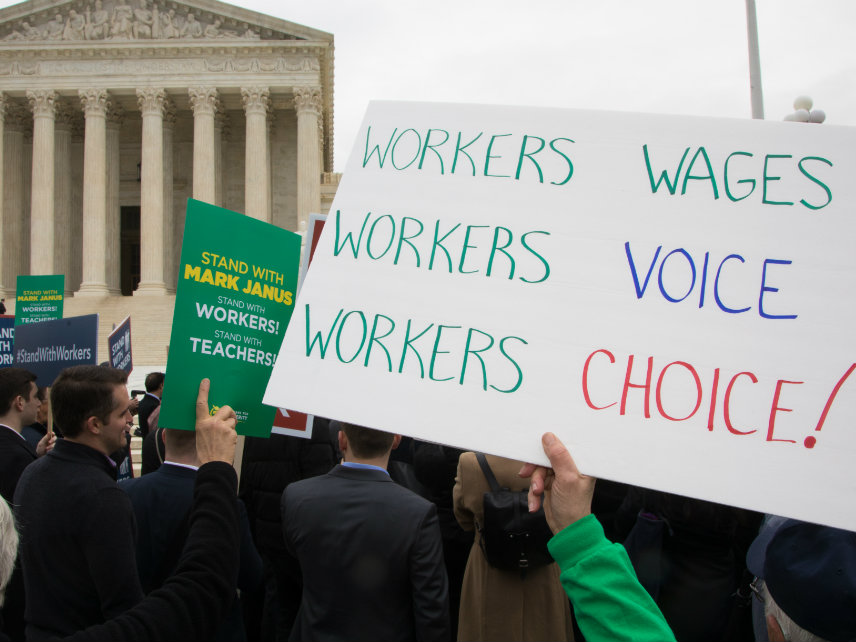Unions Could Lose 726,000 Members if Mark Janus Wins His Supreme Court Case
Union-backed report finds unions could be screwed.

If public sector workers were given the choice to stop paying union dues, many would do so, according to a new report from a union-backed think tank.
The Illinois Economic Policy Institute estimates that 726,000 workers would choose to stop paying dues if they had that choice, which public sector workers in many states currently do not. That could change after the U.S. Supreme Court announces a ruling—likely to come next month—in the much watched Janus v. AFSCME case. The plaintiff in that case, Mark Janus, has asked the court to release him from paying mandatory "fair share fees" to a union that represents him even though he has not joined it.
With the current composition of the high court, unions are bracing for a decision that would potentially cut off lucrative revenue streams. A ruling in Janus' favor could require unions to do what all other non-government entities already have to do: convince people to voluntarily support their activities.
The loss of union members and their dues could be particularly challenging in blue states, according to the IEPI report. Public sector union membership would decrease by an estimated 189,000 members in California, 136,000 members in New York, and 49,000 members in Illinois.
The report goes on to claim that giving workers the freedom to not support a union will harm wages and consumer spending, but other studies have indicated that right-to-work states—states where workers are already free to choose whether they support a union or not—have stronger economic indicators. It's fair to assume that a major shift in labor policy will create some upheaval, but the only unambiguous losers, if Janus wins, would be the labor unions that would be decoupled from their automatic gravy trains.
The unions are trying to protect a precedent set by the Supreme Court in 1977. That case, Abood v. Detroit Board of Education, upheld mandatory union fees on the grounds that non-payers would become "free riders" who could benefit from collective bargaining activities without contributing towards the associated costs.
When the Janus case was argued in front of the Supreme Court in February, the justices seemed pretty skeptical of the unions' argument, as Reason's Damon Root noted at the time: "The union's position, [Justice Anthony] Kennedy told [Illinois Solicitor General David] Frederick, involved 'mandat[ing] people that object to certain union policies to pay for the implementation of those policies against their First Amendment interests.' In other words, Kennedy seemed to suggest the mandatory fees at issue here are unconstitutional."
The IEPI report certainly won't sway the Supreme Court's opinion. It's more of a red flag for unions around the country, which may need to change tactics in the wake of Janus victory.
"A Janus decision against fair share fees would be the largest change to collective bargaining rights in the United States in decades," the report authors write. "The response to Janus will be critical to the long-run survival of the U.S. labor movement and the American middle class."
That squares with what Ben Johnson, a former head of the Vermont chapter of the American Federation of Teachers, told me in February, shortly before the case went to oral argument. He believes public sector unions actually have been hurt by Abood. He recalled a poll that was commissioned by AFT during him time as a union official, with the goal of determining why non-members had not joined the union. The most common answer? Because no one had asked them.
"The agency fee is such a core model of the business model of unions that you don't even have to bother asking people to join up," Johnson told Reason. "These are membership-based organizations, for a hundred years they lived or died by membership, and they don't even bother to ask people to join."
Losing at the Supreme Court—and losing automatic dues payments—would force unions to change how they operate. Do nothing, and they face the prospect of losing members by the thousands. The Janus case won't be the end of the American labor movement, but the loss of all those dues-paying members might force unions to concentrate on giving workers an actual reason to sign up.
Listen to a conversation between Reason's Nick Gillespie and Mark Janus below.
